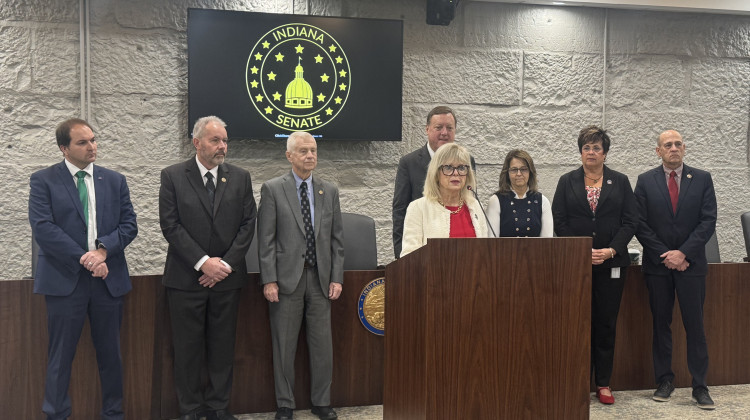
Indiana Attorney General Todd Rokita said the "Bill of Rights" is the first of an upcoming series of documents focused on parent rights and education.
Alan Mbathi/IPB NewsIndiana Attorney General Todd Rokita released a document this week called the "Parent Bill of Rights" that, in part, condemns teaching about race in schools. But some say the document is a political tool aimed at stirring division – not supporting parents and students.
Rokita's "Parent Bill of Rights" includes ways for parents to interact with school boards and review curriculum and state standards. A spokesperson for the Indiana Department of Education said it was not involved in creating the 17-page document that includes explanations of curriculum and state academic standard setting processes, as well as how school boards and the Indiana State Board of Education work.
In the document, diversity, inclusion and social emotional learning (SEL) initiatives in schools are framed as avenues for local officials to sneak lessons on race and more comprehensive lessons about the country's history with racism into classrooms.
But Rachel Burke, president of the Indiana Parent Teacher Association, said she sees the document as a political play, not something to truly serve parents.
"I think a parent should absolutely know what their rights are regarding the education of their children. I think that those rights need to come without a political agenda behind them," Burke said.
Burke, who is president of her local school board, said parents can more effectively decide what is and isn't taught to their children by directly contacting their teacher or school administrators. School board meetings aren't designed to facilitate back-and-forth conversations between concerned parents and school leaders, Burke said, and school boards don't dictate the specifics of what happens in classrooms anyway.
Join the conversation and sign up for the Indiana Two-Way. Text "Indiana" to 73224. Your comments and questions in response to our weekly text help us find the answers you need on statewide issues.
It's not the first time Rokita has jumped into the growing conversations about whether or not schools should teach more about the country's history of racism. Last month, Rokita sent a letter to the U.S. Department of Education criticizing a policy the department was considering for social studies and civics education grant programs.
Rokita's efforts come as conservative political groups and media raise the alarm over "critical race theory" – a decades old academic framework experts say is being weaponized to restrict how race is talked about in classrooms. A handful of states have already passed laws banning some topics.
In Hamilton County, school districts faced protests and accusations of students being taught critical race theory in the classroom. School leaders said that is not true.
Others worry Rokita’s document could potentially hinder efforts to better address and understand trauma.
Lori Desautels is a professor at Butler University and expert on educational neuroscience and trauma. She said social emotional learning is really a teaching method that seeks to help people better understand trauma and how it affects the learning environment.
"Social and emotional learning is really not a curriculum – it is a way of being and teaching our children about their nervous systems," she said.
Rokita, in the document, alleges some unnamed schools are using SEL initiatives to introduce theories and activities aimed at "making students feel bad about themselves."
But Desautels said racism is traumatic for people experiencing it, meaning it's impossible not to talk about race as schools look for ways to socially and emotionally support all kids, families and staff. Desautels worries the misinformation included in the document will perpetuate more division and fear in communities.
"When I think about the social and emotional competencies or SEL being connected to critical race theory, it just doesn't make sense," Desautels said.
Since releasing the document, Rokita made appearances on conservative media to talk about his concerns with "critical race theory" and Indiana schools, including Fox News and WIBC in Indianapolis.
Meanwhile, Democrats across the state were swift to push back on the politically-charged document, calling it "tone-deaf."
“Rokita’s 'Parents Bill of Rights' is just an attempt to garner attention, fails to deliver any tangible results for today’s most-pressing issues, and holds Indiana and its families back from success in the future," Indiana Democratic Party spokesperson Drew Anderson said in the statement.
Sen. Eddie Melton (D-Gary) also sent a statement saying he was "extremely disturbed" by the document.
“We can only move forward as a unified nation, with actual justice for all, if citizens are taught all of our history," he said.
Rokita said the document is the first of an upcoming series of documents focused on parent rights and education.
Contact reporter Jeanie at jlindsa@iu.edu or follow her on Twitter at @jeanjeanielindz.
 DONATE
DONATE








 Support WFYI. We can't do it without you.
Support WFYI. We can't do it without you.